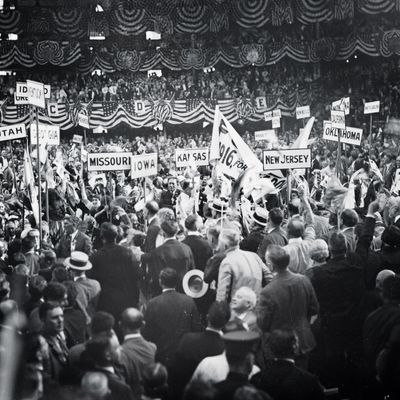
Running for president is a complicated thing with a vast array of associated tasks. Even though campaigns stay mostly focused on the immediate, there have to be strategies in place for remote (in time and likelihood) contingencies. With 21 Democratic candidates already in the field and at least one more (Steve Bullock) on the way, they must all deal with the possibility of Democrats arriving in Milwaukee in July of next year with nobody having the requisite majority of pledged delegates buttoned down.
Under this “contested convention” scenario, a strange and ironic thing would happen once a by-the-book first ballot ended in deadlock. Party superdelegates, the ex officio delegates (mostly elected officials and DNC members) who lost their independent first-ballot voting power in a post-2016 concession to angry Bernie Sanders supporters, would regain it on any second or subsequent ballot. So after being written off as nonentities, these largely Establishment figures — 769 of them in all, compared to 3,768 pledged delegates — could, in the context of a contested convention, wind up deciding it all.
As Ruby Cramer of BuzzFeed reports, the Democratic campaigns are beginning to think about this scenario. Unsurprisingly, Bernie Sanders, who has (a) prior experience running for president, (b) money to burn, and (c) a robust record of trashing the very institution of superdelegates, seems to be thinking about it most deeply:
“We’re taking superdelegates and superdelegates strategy seriously,” a Sanders aide said, “hence having a team dedicated to delegates who can prepare for multiple convention scenarios. We will be reaching out to them over the course of the campaign. When the senator wins the nomination, he’s eager to work with them to support and unite of all the party in the general and beyond.”
Of course he is.
Cramer touts Kamala Harris’s campaign as having a very effective superdelegate outreach program already, under the direction of Hillary Clinton’s top 2016 delegate tracker (who also worked for DNC chairman Tom Perez). But it’s kinda something any candidate with the resources for it would want to do even if a contested convention was impossible:
An official from Harris’s campaign pointed out that superdelegate outreach is good politics regardless of whether they factor in the convention. “All of these people — whether they are DNC members or members of Congress — have footholds in their communities,” the Harris official said. “Obviously we are reaching out to those individuals and doing our due diligence.”
That will matter a whole lot more if Democrats look up after the blitz of March primaries and see no one really in charge of the race:
[F]ully 60 percent of pledged delegates will be awarded during a two-week period running from March 3 (generally known as Super Tuesday) through March 17, when primaries are scheduled in fully half the states (a share that could go even higher if late-deciding states like New York move into this window). Depending on what happens in the four February contests that are “protected” from additional competition by national party rules (Iowa, New Hampshire, Nevada, and South Carolina, in that order), this huge bloc of early-to-mid-March states could either produce scattered results that make an early decision impossible, or could instead make one candidate the putative (not official, but certain) nominee.
In the case of a Wild West scenario, superdelegates could again walk tall in the councils of the Donkey Party, and even the fieriest of insurgents will find kind words to say about those staid Establishment figures toiling in the party’s vineyards.






























